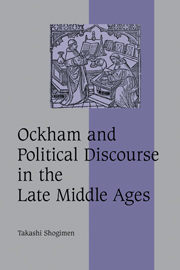Book contents
- Frontmatter
- Contents
- Preface
- List of abbreviations
- INTRODUCTION
- 1 THE POVERTY CONTROVERSY
- 2 A GENERAL THEORY OF HERESY
- 3 THE PROBLEM OF PAPAL HERESY
- 4 PAPAL PLENITUDO POTESTATIS
- 5 PETRINE PRIMACY
- 6 THE DEFENCE OF HUMAN FREEDOM
- Appendix: Ockham's ‘Dialogus’ and Marsilius' ‘Defensor pacis’
- Bibliography
- Index
- Cambridge Studies in Medieval Life and Thought Fourth series
INTRODUCTION
Published online by Cambridge University Press: 23 July 2009
- Frontmatter
- Contents
- Preface
- List of abbreviations
- INTRODUCTION
- 1 THE POVERTY CONTROVERSY
- 2 A GENERAL THEORY OF HERESY
- 3 THE PROBLEM OF PAPAL HERESY
- 4 PAPAL PLENITUDO POTESTATIS
- 5 PETRINE PRIMACY
- 6 THE DEFENCE OF HUMAN FREEDOM
- Appendix: Ockham's ‘Dialogus’ and Marsilius' ‘Defensor pacis’
- Bibliography
- Index
- Cambridge Studies in Medieval Life and Thought Fourth series
Summary
At Whitsun in May 1334, the Franciscan theologian and Oxford philosopher William of Ockham (c.1285–1347) took sheltered behind Ludwig of Bavaria, a claimant to the imperial throne, and wrote a letter to the Franciscan general chapter at Assisi. At the beginning of this letter, he explained how and why he had withdrawn obedience from Pope John XXII, fled from Avignon and joined Michael of Cesena, the Minister General of the Franciscan Order, who had been in dispute with the pope over the orthodoxy of the Franciscan doctrine of poverty. Michael of Cesena, who had himself been summoned to Avignon in December 1327, was convinced that the pope had fallen into heresy by rejecting the orthodoxy of the Franciscan doctrine, and demanded that Ockham, who was then in Avignon for an inquisition into his theological and philosophical writings, examine the papal bulls Ad conditorem canonum, Cum inter nonnullos, and Quia quorundam. Difficult as it was for Ockham to believe that the holder of the supreme ecclesiastical office could promulgate heretical doctrines, he studied the bulls. Contrary to his expectations, these papal decrees appeared, in the eyes of the Venerabilis inceptor, to be documents from the pen of a heretic: ‘In these [bulls] I found a great many things that were heretical, erroneous, silly, ridiculous, fantastic, insane, and defamatory, contrary and likewise plainly adverse to orthodox faith, good morals, natural reason, certain experience, and fraternal charity.’
This discovery determined the course of the rest of Ockham's life.
- Type
- Chapter
- Information
- Publisher: Cambridge University PressPrint publication year: 2007

